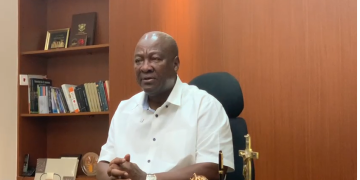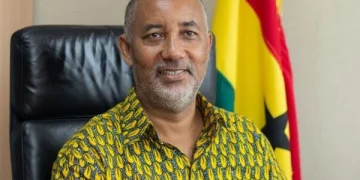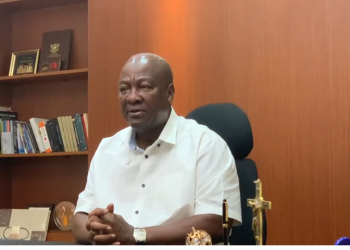Acting CEO of the Precious Minerals Marketing Company (GoldBod), Sammy Gyamfi, has emphatically denied any allegations of bribery or corruption in the issuance of mining licenses under his leadership.
Speaking on Asempa FM’s Ekosiisen program monitored by Kumasimail, Gyamfi highlighted the robust, technology-driven licensing system implemented at GoldBod that eliminates human interference and promotes transparency.
According to Gyamfi, the licensing process at GoldBod has been fully digitized, allowing applicants to apply, pay fees, and track their application status online without any direct human contact until the final issuance of the license.
This innovation, he said, has significantly reduced opportunities for corrupt practices.
“We have introduced a modern online platform where you can apply for a GoldBod license without even knowing the CEO. You apply online, pay online, and track your application status online. The only time you see a human element in the process is when you’re coming for your license,” Gyamfi explained.
To date, under his stewardship, GoldBod has issued 615 licenses swiftly and without any reported incidents of bribery or extortion.
He stressed, “We’ve given 615 in record time. No one can accuse me of taking even a single Ghana cedi in exchange for licenses.
“No bribery, no corruption, no extortion, no delay record time at the speed of light,” he firmly added.
Gyamfi also addressed the longstanding challenge of traceability in Ghana’s mining sector, particularly within the small-scale mining segment.
While large-scale mining operations have traceability mechanisms, small-scale mining has historically lacked such systems, making it difficult to track the origin of exported gold.
“We have been mining gold since colonial times, yet there was no effective traceability system for small-scale miners. That is changing,” he said.
Upon assuming office, Gyamfi’s team cancelled all old licenses and introduced a new licensing regime supported by a modern website, aiming to formalize and regulate the sector.
*Licensing Breakdown and Sector Formalization*
The current licensing figures reflect the progress made:
1. Aggregator licenses issued: 1
2. Self-financing aggregator licenses: 4
3. Buyer Tier 2 (sub-aggregators): 263 approved, 192 licenses issued
4. Buyer Tier 1 (grassroots buyers): 348 approved, 123 licenses issued.
Gyamfi emphasized that the difference between approvals and issued licenses is due to pending payments by some applicants.
He added that overall, 615 licenses have been approved, with 319 printed and issued in record time.
“So, that’s where traceability starts. If you don’t know the person buying the gold, how will you be able to trace it? It starts with formalizing the sector and licensing the various buyers and players.” he remarked.
The Acting CEO acknowledged that establishing a comprehensive traceability system for artisanal and small-scale mining (ASM) is a complex and gradual process.
“Then, you need to employ technology that will enable you to know where the gold was mined. It’s not a small task; it’s very difficult. Even in advanced countries, traceability is not easy.”
Since the enabling law was passed only in April, he emphasized that building such a system cannot happen overnight.
“When I joined GoldBod, the law was passed on April 2nd. So, am I supposed to establish traceability for the entire ESM within two or three months? No,” Gyamfi stressed, calling for more time.
However, President John Dramani Mahama has mandated that by 2026, Ghana should have a fully operational traceability system for ASM gold.
“The good thing is, President Mahama has given us instructions that by 2026, we will have a traceability system for ASM. The system will be procured, but after procuring it, you have to onboard the miners, and that will take time,” he emphasized.
Gyamfi outlined the next steps, including procuring the necessary technology and onboarding miners to the new system.
“Rome was not built in a day. We expect that within the next two to three years, we will have a system capable of tracking every ounce of gold mined in Ghana,” he said.
Gyamfi also touched on the policy dilemmas surrounding untraceable or illegal gold.
“Afterwards, the government will have to make a policy decision regarding gold whose origin is unknown or illegal gold. What will we do with it? It’s a very controversial issue,” he hinted.
He posed critical questions about how the government should handle gold from miners without licenses or traceability.
“If someone holds gold but does not have a license, should the government reject the gold? If rejected, will the gold be smuggled? Or should there be punitive pricing for untraceable gold compared to traceable gold that meets international standards like those required by LBMA refineries?” he queried.
Source :www.kumasimail.com /Kwadwo Owusu


































































